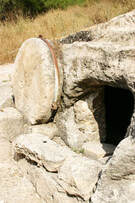 Our friend, Tas Walker, answers some fair questions about Easter here. On the origin of the English word Easter, he says: it came from the Germanic Ost, for east, and rising. "it’s most doubtful that any Eostre was ever worshipped, because the only evidence is from Bede. And he never mentioned any animal associated with her. A non-existent association with a non-existent goddess is hardly good grounds for seeing paganism in the Easter bunny!" On the question of three days and nights, he says: the term "third day" was interchangeable with "3 days & nights" back in the culture of the day. "So while X days and X nights can mean what it means in English, this was only a subset of its semantic range in Jewish idiom... "Note that even His enemies understood that ‘after three days’ meant that they only had to secure the tomb ‘until the third day’. If three full 24-hour periods were meant, then they would want to secure the tomb until the fourth day to make sure. So for Jews, the phrases ‘on the third day’, ‘after the third day’, ‘until the third day’ and ‘three days and three nights’ were synonymous." Enjoy the details. Comments are closed.
|
Categories
All
Archives
July 2024
|
 RSS Feed
RSS Feed